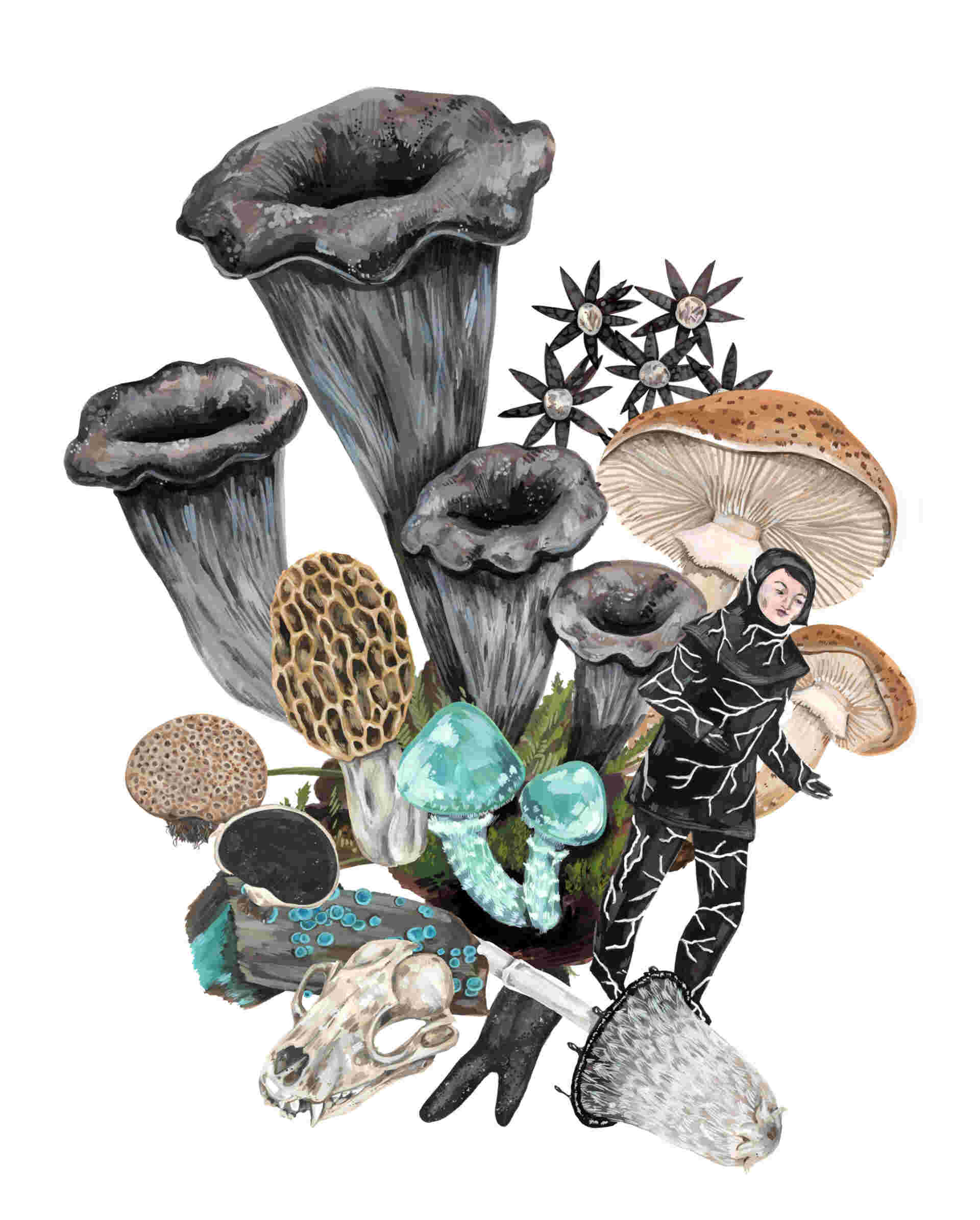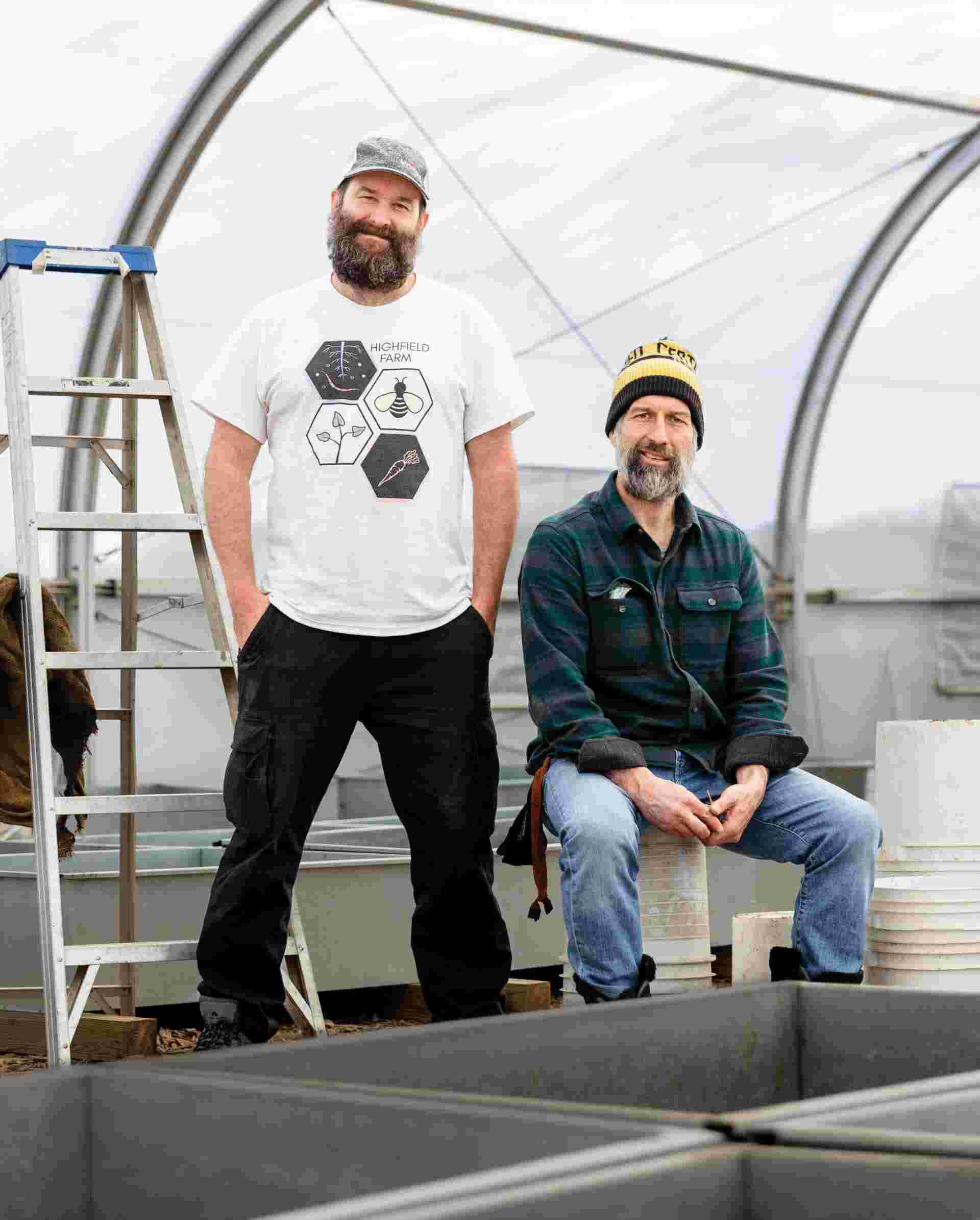
Hidden Kingdom
The Conversation On mushrooms, interdependence and artists’ role on the sustainability front.
By Ximena González
Photo by Dylan Leeder

Dorion (left) and Fish have known each other for 35 years. Their shared interest in permaculture brought them together as co-conspirators, leading to the creation of Highfield Farm in 2020.
With a collective background working in composting, living soils, edible landscapes and permaculture, in 2019, long-time friends Mike Dorion, Jay Fish and Jeremy Zoller joined forces with the City of Calgary to launch a state-of-the-art project: a regenerative farm on a post-industrial site called a brownfield.
“We wanted to excite our community and bring that land back to life,” says Fish, reminiscing about the site’s former glory as the Blackfoot Farmers’ Market, a farmer-led market that operated from 1983 to 2008.

To help revitalize Highfield Farm’s depleted soil, more than 100 native plant plugs were installed last year. The farm’s regenerative practices helped divert roughly 7,050 cubic yards of landscaping waste from the landfill and produced 25 cubic yards of compost.

Each season, more than a hundred volunteers help weed, water and seed.
With the help of 144 volunteers, Highfield Farm produced over 2,000 pounds of fresh produce last year, a third of which was donated to Calgary food charities.
In operation since 2020, Highfield Farm originated as a city-led initiative to reactivate a vacant lot in Calgary’s inner city. But when Dorion, Fish and Zoller took over the program’s first (and, so far, only) site, their passion for self-sufficient agricultural ecosystems transformed the underused 15,000-square-foot land parcel into something more than just an urban farm.
Active participants in Calgary’s permaculture and composting scenes, the trio have succeeded in creating a community hub where members of groups such as the Calgary Horticultural Society and the Permaculture Calgary Guild converge. “We set out to join these groups,” says Fish. “[To] have a space for them all to operate and stay passionate about their work.”
Prior to launching Highfield Farm, Zoller and Fish grew heirloom tomatoes together. Currently, Zoller runs Sunshine Earth Works, an edible-landscape construction enterprise, while Dorion has been working with compost for nearly a decade at his company Living Soil Solutions.
As the skills and interests of the trio blend seamlessly, their vision of an urban agriculture model that can be replicated in brownfield sites across the city is slowly materializing.
“We’re trying to create a system that [makes] things better and improves them as we continue through our process,” Dorion says about their agricultural practices.
Because of the site’s past uses, the soil hasn’t yet been deemed suitable to grow produce for consumption. So the implementation of regenerative agriculture practices is expected to transform the dirt into soil. To infuse nutrients into the tightly compacted earth and remove any traces of pollutants, native grasses and cover species such as mushrooms and willows will be planted on the site.
“After being used as the farmers’ market, [the site] was used as a parking lot,” Fish says, “so it got a lot of soil compaction, not a lot of organic matter.”

Even in the quieter winter months, there’s still work to do. Building and repairing growing beds and seeding racks keeps the volunteer team busy before spring.

Before planting, seeds are placed on a seeding rack for up to eight weeks until they sprout. In Calgary, the growing season starts in late May and ends in September.
In the meantime, nutrient-dense produce—including lettuce, carrots and green beans—grows in 44 raised beds that occupy an area of roughly 11,000 square feet. Dorion explains that growing these staples in Calgary ensures that they retain the nutrients that, otherwise, would be lost after travelling a long distance from a warmer place.
Despite the benefits of urban agriculture, two of the main obstacles to the long-term sustainability of this practice in Calgary are the long winters and the high cost of labour. At Highfield Farm, the group is addressing the former by adapting planting plans to the local climate and the latter by encouraging the community to lend a hand.
Currently, the farm hires one full-time operations manager, Heather Ramshaw, and an intern or two in the summer. And during Calgary’s short growing season, between late May and September, more than a hundred volunteers help weed, water and seed, which made the production of roughly 2,000 pounds of fresh produce possible in 2022.
But returning the land to a productive state isn’t the only goal of Highfield Farm: For Dorion, Fish and Zoller, fostering social connection during a challenging time is also essential. For this reason, the group created a number of programs that allow Calgarians to learn about our food system and the important role people play in it.
“We wanted to inspire people to come and take a class and learn how to grow a few things,” Fish says, “and maybe get the idea that they could take a more active role in that. [Here,] there’s a place to learn and there’s a community of people to support you.”
After the installation of a greenhouse last year, the growing capacity of the farm is expected to double in 2023. This expansion will allow Highfield Farm to increase the amount of fresh produce it donates to the Calgary Food Bank and The Mustard Seed, two of the city’s most prominent not-for-profit organizations.
“It’s part of that generative model,” says Dorion. “If you’re going to grow a certain amount of food, then some of that abundance gets shared. If we can share it with these food-security groups, then that’s a win for everyone.”
While Highfield Farm is still a pilot project, the seeds the Calgary trio plant today will continue to reap fruit in the years to come. “It’s a labour of love,” says Fish. “It’s an investment into the future for us.”